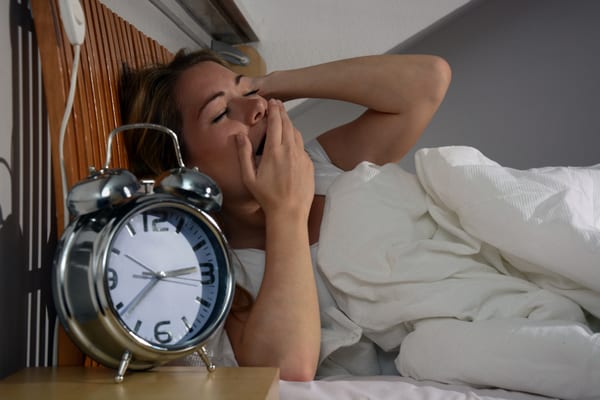If you’re feeling sleepy or tired while you read this and wish you could get some more shut-eye, you’re not alone. A majority of Americans say they would feel better if they could have more sleep, according to a new Gallup Poll. But in the good ol’ U.S. of A., the ethos of grinding and pulling yourself up by your own bootstraps is ubiquitous, both in the country’s beginnings and our current environment of always-on technology and work hours. And getting enough sleep can seem like a dream.
As NBC News reports, the Gallup poll, released Monday, found 57% of Americans say they would feel better if they could get more sleep, while only 42% say they are getting as much sleep as they need. And it appears the problem is getting worse. In 2013, when Americans were last asked, it was just about the reverse — 56% saying they got the needed sleep and 43% saying they didn’t.
The results aren’t gender neutral either. The poll skewed much worse for women, especially women under the age of 50, who were especially likely to report they aren’t getting enough rest.
The poll also asked respondents to report how many hours of sleep they usually get per night: Only 26% said they got eight or more hours, which is around the amount that sleep experts say is recommended for health and mental well-being. Just over half, 53%, reported getting six to seven hours. And 20% said they got five hours or less, a jump from the 14% who reported getting the least amount of sleep in 2013.
And just to make you feel even more tired, in 1942, the vast majority of Americans were sleeping a heck of a lot more. Some 59% said they slept eight or more hours, while 33% said they slept six to seven hours. And practically no one even considered a five hours or less category. Says Sarah Fioroni, a senior researcher at Gallup, “That five hours or less category … was almost not really heard of in 1942. There’s almost nobody that said they slept five hours or less.”
The Pandemic Might have Escalated the Problem
The poll doesn’t get into reasons WHY Americans aren’t getting the sleep they need, and since Gallup last asked the question in 2013, there’s no data breaking down the particular impact of the last four years and the pandemic era. While the poll only shows a broad shift over the past decade, living through the Covid-19 pandemic may have affected people’s sleep patterns.
But what’s notable, says Fioroni, is the shift in the last decade from perhaps not being worried about it, to more Americans thinking they would benefit from more sleep, as well as the big jump in the number of people saying they get five or less hours a night.
In modern American life, there also has been “this pervasive belief about how sleep was unnecessary — that it was this period of inactivity where little to nothing was actually happening and that took up time that could have been better used,” said Joseph Dzierzewski, vice president for research and scientific affairs at the National Sleep Foundation. It’s only relatively recently that the importance of sleep to physical, mental and emotional health has started to percolate more in the general population, he said.
And there’s still a long way to go. For some Americans, there simply aren’t enough hours in the day. So even though you might recognize the importance of sleep, it often comes in below other priorities like your kids and taking care of your household.
Revenge Bedtime Procrastination
Also discussed in post-Covid life is “revenge bedtime procrastination,” in which people put off sleeping and instead scroll on social media or binge a show as a way of trying to handle stress.
People want to take some time for themselves at the end of a long day, to decompress and have some “me time” before going to sleep and starting the whole grind all over again in the morning. The result is sacrificing sleeping hours to make it happen, creating a vicious sleepless cycle.
To help end that cycle, the key is rethinking the “me time” as sleep time, especially considering the enormous mental and physical health benefits to getting one or two hours more of shut eye every night.
There’s a Cultural History to “Getting ‘Er Done”
So why are we awake all the time? One likely reason for Americans’ sleeplessness is cultural — a longstanding emphasis on industriousness and productivity.
Some of the context is much older than the shift documented in the poll. It includes the Protestants from European countries who colonized the country, said Claude Fischer, a professor of sociology at the graduate school of the University of California Berkeley. Their belief system included the idea that working hard and being rewarded with success was evidence of divine favor.
“It has been a core part of American culture for centuries,” he said. “You could make the argument that it … in the secularized form over the centuries becomes just a general principle that the morally correct person is somebody who doesn’t waste their time.”
Jennifer Sherman has seen that in action. In her research in rural American communities over the years, the sociology professor at Washington State University says a common theme among people she interviewed was the importance of having a solid work ethic. That applied not only to paid labor but unpaid labor as well, like making sure the house was clean.
A through line of American cultural mythology is the idea of being “individually responsible for creating our own destinies,” she said. “And that does suggest that if you’re wasting too much of your time … that you are responsible for your own failure.” She adds, “the other side of the coin is a massive amount of disdain for people considered lazy.”
—
Photo Credit: Dan Race / Shutterstock.com
